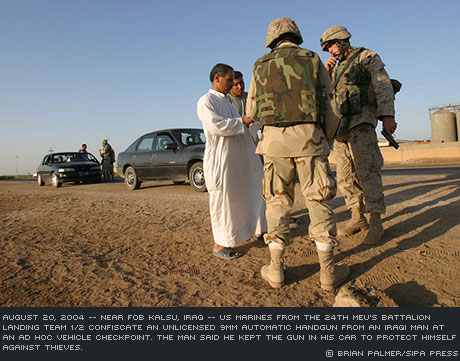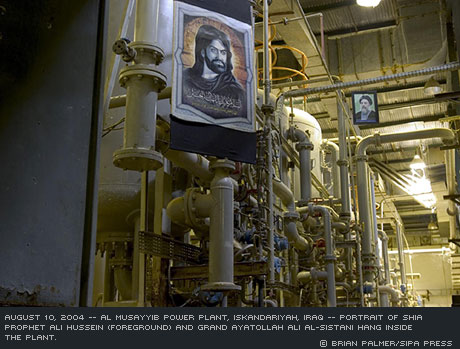|
|
 |
Camp
Iskandariyah/FOB Kalsu/Camp Doha, Kuwait
The 24th Marine Expeditionary Unit's Battalion Landing Team 1/2 has
settled into Camp Iskandariyah, a collection of tents and trailers
erected at al Musayyib Power Plant south of Baghdad, after a little
over a month in-country. Each element of the MEU and the BLT, the
combat arm of the expeditionary unit, has established its own rhythm.
The Combat Operations Center, the camp's throbbing brain, directs
them in their daily tasks -- convoys, patrols, raids, mess duty, trash
removal. Day segues seamlessly into night in the windowless COC. Only
the personnel changes.
Patrols push out from Iskandariyah several times a day, around the
clock, and fan out across Northern Babil province, the MEU's operating
area. The Marines drive and observe; they hunt the suspicious and
potentially dangerous. The men dull the tedium by chewing tobacco,
smoking, and sipping from water bottles and Camelbacks. Because the
engines growl too loudly to talk comfortably, most conversations in
the Humvee are operational -- "maintain vehicle dispersion"
or "Take a left. Left!"-- not personal. When no one shoots
at the vehicles or detonates an IED -- improvised explosive device
-- and no one crashes, that's a good patrol.
To me, a civilian, a Marine patrol appears to be little more than
a rolling target to anyone searching for one, I said to Lieutenant
Scott Wiese. "That's the purpose of a patrol," he replied,
"to close with and destroy the enemy with fire and maneuver."
Patrols are supposed to draw out the bad guys, corner them, and then
kill them.
"We don't lose," Wiese asserted. The battle or the war,
I asked? "We're at the tactical level," Wiese explained
to me, patiently. "We just do what we're told." The next
level is strategic, the generals. The top level is -- I interrupt
him: "Political?" He nodded.
The Marines continue to battle an elusive enemy they often can't distinguish
from scared or indifferent local citizens. Marines are shot at and
beset with exploding IEDs. They fire back with M-16s, artillery and
mortars. They capture weapons, detain suspects, and occasionally discover
IEDs planted along the roadside before they are detonated.
Marines from the BLT have been wounded in combat and during routine
operations. (The MEU doesn't have exact numbers.) A little more than
a week ago, Lance Corporal Dustin Fitzgerald from Montgomery, Ohio,
was killed when his Humvee rolled into a ditch. No one dwells openly
on such losses; Marines simply plow into the next mission, the next
day.
Outside the Wire
"What are our chances of surviving a blast in this?" a Marine
in the back seat of a Humvee asked the driver as they rolled slowly
through a stretch of blind curves on the way to Jurf-as-Sakhar, a
city US forces avoid because they get shot at or IEDed whenever they
pass through. Grunts walked ahead of the convoy scanning the roadside
for IEDs. "Maybe four out five," Corporal Schramm, the driver,
replied nonchalantly. Good odds, considering past experience.
Civil Affairs Group Marines visited a Jurf-as-Sakhar health clinic
that houses a half-finished birthing facility. The Army funded the
project when it started, then cut off cash because of the attacks.
The Marines promised local leaders they would resume support -- if
they pledged to cooperate in the fight against violent insurgents.
The clinic's director received the visiting Marines warily, but he
received them nonetheless, a brave thing to do in such a town. The
gravity of his decision was apparent to me in his tortured expression
and noncommittal answers. "All we ask is that the people in this
area treat us as friends," CAG Major Tom West said to the doctor.
"It will take time," the doctor replied cautiously.
Across the street lay the shell of Jurf-as-Sakhar's city council building.
The shadowy forces that target Americans and the Iraqis who work with
them torched it. The attackers scrawled graffiti on the concrete edifice
-- "Death to Traitors!" "Yes to Jihad!" "Kill
Every American and Foreigner!" The police station next door was
razed. The police chief was executed 500 meters from the
front door.
Major West led a foot patrol up the city's main street, a textbook
show of force by the Marines. Two columns of men, M-16s at the ready,
marched briskly along the roadway. Shop owners and pedestrians
watched.West and a few of the other Marines waved, and some people
waved back, but the reception could not be called warm. |
 |
 |
|


